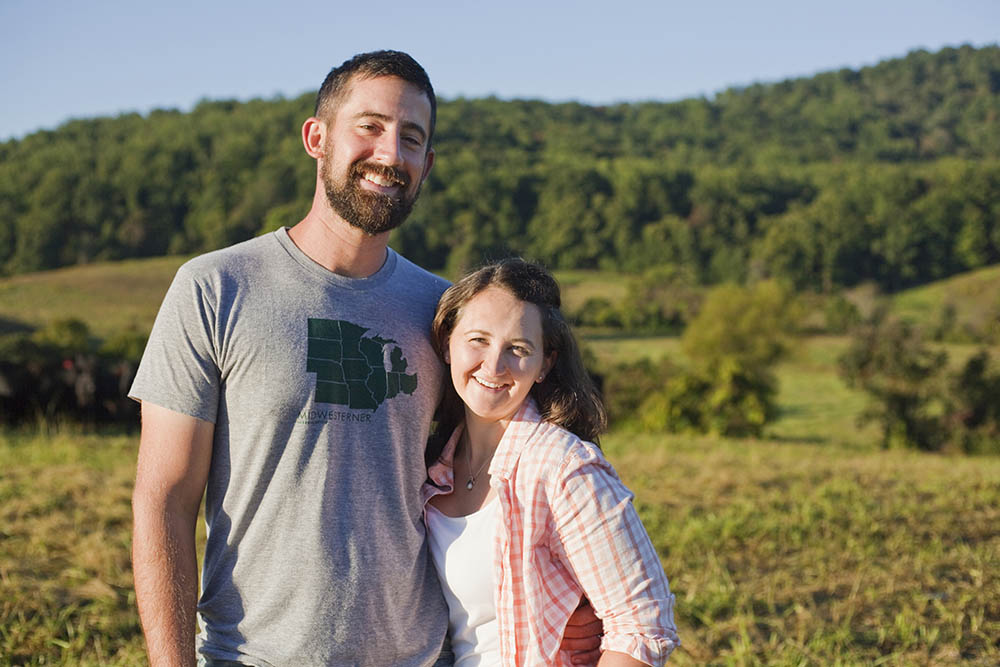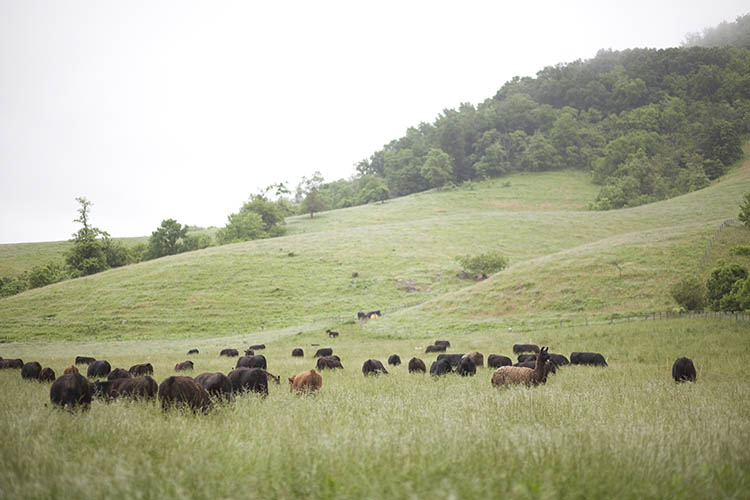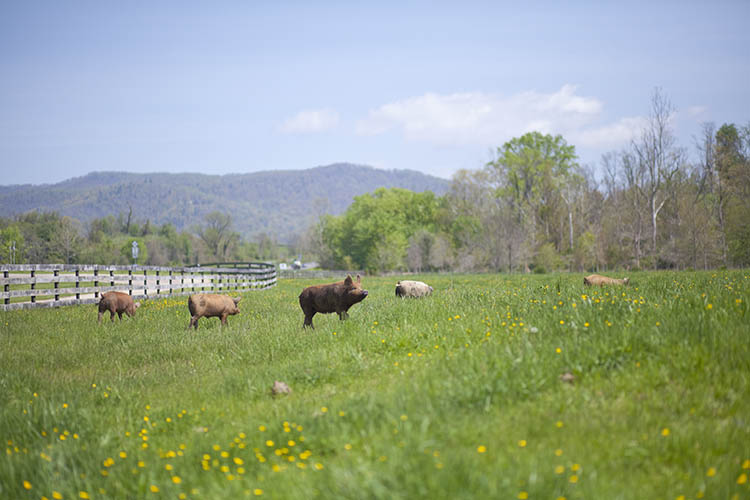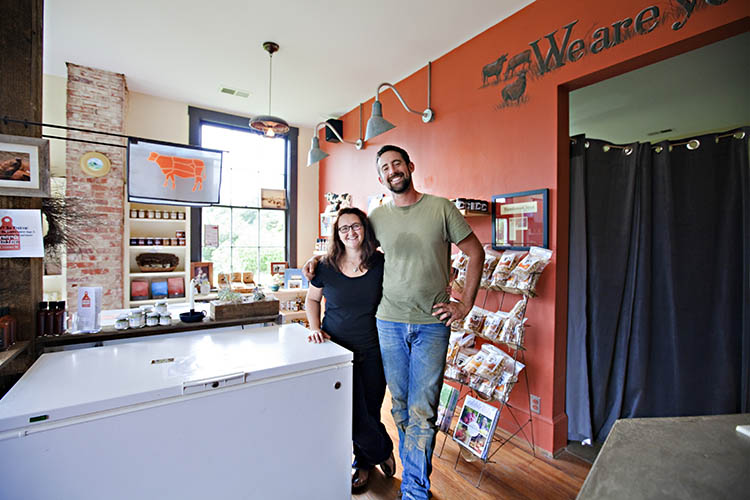Working as a chef, Mike Peterson used to drive by the green, cattle-flecked acres of Mount Vernon Farm near Sperryville on his way to the Inn at Little Washington. And when he signed up for a six-month internship at the farm — to learn more about the sustainable farming methods behind the beef — he never thought he’d end up staying.

“He had every intention of going back to the kitchen. He was there 11 months, and then the manager left, and he stayed,” said Mike’s wife, Molly Peterson, who was soon roped into the family business of farming as well.
The Petersons took over management of the grass-based cattle farm in 2010 and, three years later, began the process of buying the business from its owner, Cliff Miller. And in the fall of 2013, the Petersons formed and began operating the livestock business as Heritage Hollow Farms.
They still lease the land from Miller and one other landowner in Rappahannock County. “I wish more farmers that want to retire or landowners with land just sitting there would give young farmers the opportunity, because that’s the biggest hurdle for farmers is finding land they can afford. Securing access to start up capital has proven to be a necessity, too. Scalability requires upfront capital to make the whole operation tick,” Molly said.
Along with their lease with Miller to farm 250 of his acres, the Petersons inherited a lease Miller had with nearby landowner Dick McNear for 380 acres of his pastures. The lease between McNear and Miller was originally written in pencil on lined notebook paper — two pages, front and back, explained Molly.
But that doesn’t mean it didn’t cover a lot of ground. It became the template for the Petersons’ lease agreement with both parties, and both leases cover a lot more than the land.
“I wish more farmers that want to retire or landowners with land just sitting there would give young farmers the opportunity, because that’s the biggest hurdle for farmers is finding land they can afford.”
Earning a herd
Though having access to more than 600 acres of grass for their cows was a boon for the beginning farmers, they also needed help getting started with a herd.
As part of the leases, the Petersons manage 95 breeding cows owned by McNear and 60 owned by Miller. In exchange for their daily management labor, mineral supplementation and hay feeding for those cows, Heritage Hollow has the option of buying the calves those cows produce at a discounted rate.

“It’s a way for us to get into it without having to make the investment into cows, without having to buy any land,” Mike said.
As the new calves that Mike and Molly manage are weaned, the Petersons can buy the calves (them) from Miller and McNear for 25 percent of their appraised value. From here on the Petersons own the calves, which they will either sell at the livestock market or continue to graze and finish on grass- to be sold later directly to customers as Heritage Hollow grass-fed beef.
As you can imagine their leases cover a lot of territory, but there are still some gray areas when it comes to managing animals and land owned by someone else.
Because the landowners still own the cows, they are in charge of supplying water to them, which is mostly handled by existing watering troughs and piping. The Petersons maintain that infrastructure.
The same goes for the fencing. If a tree falls on it, the Petersons patch it, “but we’re not responsible for a complete overhaul or replacement,” Molly said.
They have access to the landowners’ tractors and trucks to care for the property and the cows, but they rent that same equipment when using it for the other animals they own outright.

Deciding who takes care of what with the cows they manage can be a little trickier. Something that’s come up is what to do when the herd has a lower fertility rate, which means fewer calves for the Petersons.
“There is a lot of gray area that we still figure out as we go. There are things we never thought of at the time we wrote the leases that have come up,” Mike said. But overall, “there’s a mutual understanding. We both have a mutual vested interest in it, so it’s to all of our benefit that the (cows) be cared for.”
Investing in the Land
Mike first got to know McNear at a Holistic Management Training conference in Rappahannock County — one that changed the way McNear raises cattle and cares for his land after some 50 years in the business.
The holistic training focuses on “mob grazing” management that uses electric fences to continually move cattle through the fields, fertilizing the soils as they eat the grass and giving each field time to recover between feedings.
McNear admits that he was the “biggest skeptic” about the grazing techniques taught at the conference, at first. But, after the first year of grazing with the new methods, “he was so thrilled by how his pastures were looking,” Molly said.
McNear knew that he wanted to work with farmers who would graze the cattle with an eye toward soil fertility, and that’s just what the Petersons had in mind. They took over his lease with Miller three years ago, and it expires in 2017.
Long-term leases with young farmers allow them to leave the options open for their children, should they want to farm the property themselves or alter agreements, while ensuring that the land is productive in the meantime.
Both McNear and Miller are in the process of transitioning the land their families own to the next generation. Long-term leases with young farmers allow them to leave the options open for their children, should they want to farm the property themselves or alter agreements, while ensuring that the land is productive in the meantime.
Miller is a decade into his 40-year lease agreement with a pair of vegetable farmers on a portion of the land his family owns, and he’d like to see a similar arrangement happen with the Petersons once their initial 5-year lease expires.
“Hopefully, (Mike) will find that this is the way he wants to spend the rest of his life, and we’ll enter into a long-term lease,” Miller said.
Heritage Hollow Farm Store- Growing the Business

In their first year as Heritage Hollow Farms, the couple is still looking to grow their own herd and considering leasing additional lands in the area. Along with harvesting up to 100 of the cattle they acquire each year, the Petersons own and raise 100 pigs and 60 to 80 lambs on the land leased from Miller.
Miller’s farm had already spent nearly a dozen years establishing local buyers’ clubs through which his grass-fed beef was sold directly to customers in the Washington metro area.
The Petersons tweaked their delivery routes a bit after transitioning those customers to Heritage Hollow, but direct retail sales are still the bread-and-butter of their beef business. The Peterson’s were able to open a new farm store, up the street from Heritage Hollow, at the Sperryville Schoolhouse— an investment they could afford because they weren’t burdened with the costs of buying land and infrastructure. They sell a growing percentage of their meat products through the store, and have cut back on the number of places they deliver in the DC area.
Sometimes they have to explain to customers who stop by the store that the meat comes from their farm from across the street— and not suppliers.
“We have a little bit of confusion where we have to tell people that we are the farmers,” Molly said. “That’s why we’ve got a painting on the wall that says, ‘We are your farmers.’”
This story is part of “Finding a Place to Grow“, a publication produced by The Piedmont Environmental Council. The stories were written by Whitney Pipkin, a freelance journalist from Alexandria, VA who covers food, farms, and the environment. Her work appears in the Washington Post, Virginia Living and the Chesapeake Bay Journal, among others, and she writes at thinkabouteat.com.
The publication was made possible by a grant from The Beirne Carter Foundation.
